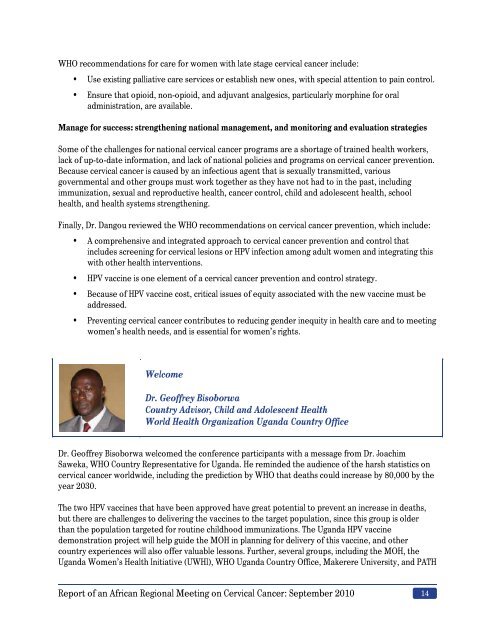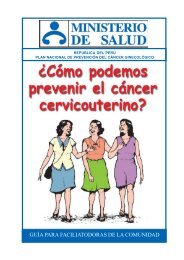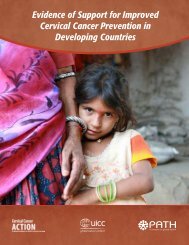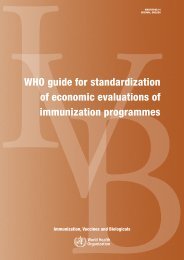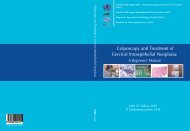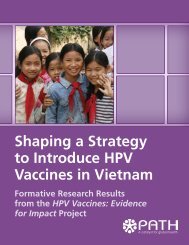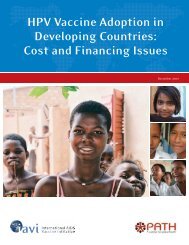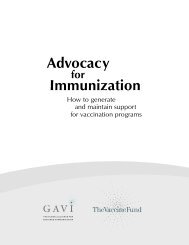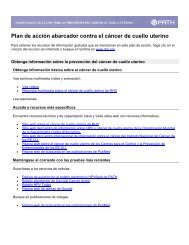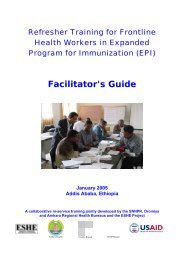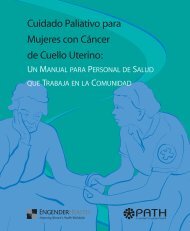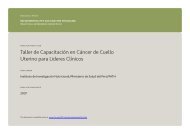Download file, English (1 MB PDF) - RHO
Download file, English (1 MB PDF) - RHO
Download file, English (1 MB PDF) - RHO
Create successful ePaper yourself
Turn your PDF publications into a flip-book with our unique Google optimized e-Paper software.
WHO recommendations for care for women with late stage cervical cancer include:<br />
• Use existing palliative care services or establish new ones, with special attention to pain control.<br />
• Ensure that opioid, non-opioid, and adjuvant analgesics, particularly morphine for oral<br />
administration, are available.<br />
Manage for success: strengthening national management, and monitoring and evaluation strategies<br />
Some of the challenges for national cervical cancer programs are a shortage of trained health workers,<br />
lack of up-to-date information, and lack of national policies and programs on cervical cancer prevention.<br />
Because cervical cancer is caused by an infectious agent that is sexually transmitted, various<br />
governmental and other groups must work together as they have not had to in the past, including<br />
immunization, sexual and reproductive health, cancer control, child and adolescent health, school<br />
health, and health systems strengthening.<br />
Finally, Dr. Dangou reviewed the WHO recommendations on cervical cancer prevention, which include:<br />
• A comprehensive and integrated approach to cervical cancer prevention and control that<br />
includes screening for cervical lesions or HPV infection among adult women and integrating this<br />
with other health interventions.<br />
• HPV vaccine is one element of a cervical cancer prevention and control strategy.<br />
• Because of HPV vaccine cost, critical issues of equity associated with the new vaccine must be<br />
addressed.<br />
• Preventing cervical cancer contributes to reducing gender inequity in health care and to meeting<br />
women’s health needs, and is essential for women’s rights.<br />
Welcome<br />
Dr. Geoffrey Bisoborwa<br />
Country Advisor, Child and Adolescent Health<br />
World Health Organization Uganda Country Office<br />
Dr. Geoffrey Bisoborwa welcomed the conference participants with a message from Dr. Joachim<br />
Saweka, WHO Country Representative for Uganda. He reminded the audience of the harsh statistics on<br />
cervical cancer worldwide, including the prediction by WHO that deaths could increase by 80,000 by the<br />
year 2030.<br />
The two HPV vaccines that have been approved have great potential to prevent an increase in deaths,<br />
but there are challenges to delivering the vaccines to the target population, since this group is older<br />
than the population targeted for routine childhood immunizations. The Uganda HPV vaccine<br />
demonstration project will help guide the MOH in planning for delivery of this vaccine, and other<br />
country experiences will also offer valuable lessons. Further, several groups, including the MOH, the<br />
Uganda Women’s Health Initiative (UWHI), WHO Uganda Country Office, Makerere University, and PATH<br />
Report of an African Regional Meeting on Cervical Cancer: September 2010 14


